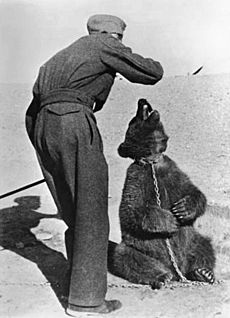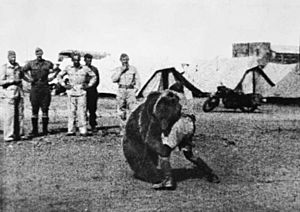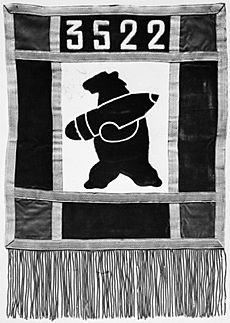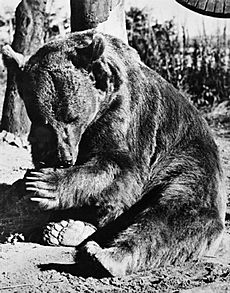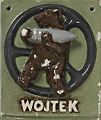Wojtek (bear) facts for kids
Quick facts for kids
Corporal Wojtek
the Soldier Bear
|
|
|---|---|
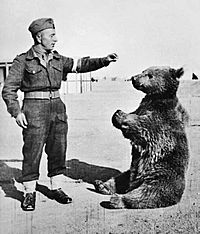
Polish soldier with Wojtek in 1942
|
|
| Born | 1942 Hamadan, Iran |
| Died | 2 December 1963 (aged 21) Edinburgh Zoo, Scotland |
| Allegiance | Poland |
| Service/ |
|
| Years of service | 1943–45 |
| Rank | |
| Unit | 3522, 22nd Artillery Supply Company, II Corps (Poland) |
| Battles/wars | World War II |
| Memorials | Wojtek Memorial Trust |
Wojtek (pronounced VOY-tek) was a special Syrian brown bear. He was bought as a young cub by Polish soldiers in Hamadan, Iran. To make sure he could get food and travel with them, he was officially made a soldier. He started as a private and later became a corporal.
Wojtek traveled with the Polish II Corps to Italy during World War II. He served with the 22nd Artillery Supply Company. During the famous Battle of Monte Cassino in 1944, Wojtek helped move heavy boxes of ammunition. He became very well-known among Allied generals and leaders. After the war, he left the army and lived the rest of his life at the Edinburgh Zoo in Scotland.
Contents
Wojtek's Life Story
In the spring of 1942, a Polish army group called Anders' Army was moving from the Soviet Union to Iran. Many Polish civilians, who had been forced to leave their homes, were with them. At a train station in Hamadan, Iran, on April 8, 1942, Polish soldiers met a young Iranian boy. He had found a bear cub whose mother had been shot.
A young Polish refugee named Irena Bokiewicz, who was 18, really liked the cub. She convinced a soldier to buy the bear. For the next three months, the cub lived in a Polish refugee camp near Tehran, mostly cared for by Irena. In August, the bear was given to the 2nd Transport Company. This company later became the 22nd Artillery Supply Company. The soldiers named him Wojtek. The name Wojtek means "Happy Warrior" in Polish.
At first, Wojtek had trouble eating solid food. He was fed condensed milk from a bottle. Later, he ate fruit, marmalade, honey, and syrup. He also enjoyed drinking coffee in the mornings. He would sometimes sleep with the soldiers to keep warm. Wojtek loved to wrestle with the soldiers and learned to salute them. He became a popular mascot for all the army units nearby. With the 22nd Company, he traveled through Iraq, Syria, Palestine, and Egypt.
Wojtek often copied the soldiers. He would even march on his hind legs because he saw them doing it. He had his own special caregiver. Wojtek grew up while traveling with the army. By the time of the Battle of Monte Cassino, he weighed about 200 pounds (91 kg).
Wojtek Becomes a Soldier
From Egypt, the Polish II Corps was sent to Italy to fight alongside the British Eighth Army. There was a rule that no mascots or pets were allowed on the British transport ship going to Italy. To get around this rule, Wojtek was officially made a soldier in the Polish Army. He was listed as a private in the 22nd Artillery Supply Company. Two soldiers, Henryk Zacharewicz and Dymitr Szawlugo, were assigned to take care of him.
As an official soldier, Wojtek had his own paybook, rank, and serial number. He lived with the other men in tents or in a special wooden crate that was carried by truck. During the Battle of Monte Cassino, Wojtek helped his unit by carrying heavy 100-pound (45 kg) crates of 25-pound artillery shells. He never dropped any of them. He copied the soldiers, lifting boxes that normally needed four men. He would stack them onto trucks or other ammunition boxes.
Because of his help at Monte Cassino, Wojtek was promoted to the rank of corporal. To honor Wojtek's bravery, the 22nd Company adopted a picture of a bear carrying an artillery shell as their official symbol.
Life After the War
After World War II ended in 1945, Wojtek traveled to Berwickshire, Scotland, with the rest of the 22nd Company. They stayed at Winfield Airfield near the village of Hutton, Scottish Borders. Wojtek quickly became popular with the local people and the news reporters. The Polish-Scottish Association even made him an honorary member.
On November 15, 1947, Wojtek was officially released from the army. He was then given to the Edinburgh Zoo, where he lived for the rest of his life. Journalists and former Polish soldiers often visited him. Media attention made Wojtek even more famous. He was even a guest on the BBC children's TV show Blue Peter.
Wojtek passed away in December 1963, when he was 21 years old. He weighed almost 500 kilograms (1,100 lb) and stood over 1.8 metres (5.9 ft) tall.
Wojtek's Legacy
Wojtek is remembered in many ways:
- There is a plaque at the Imperial War Museum in London.
- A sculpture by David Harding is at the Polish Institute and Sikorski Museum in London.
- A wooden sculpture can be found in Weelsby Woods, Grimsby.
- In 2013, the city of Kraków in Poland decided to build a statue of Wojtek in their Jordan Park. It was revealed on May 18, 2014, which was 70 years after the Battle of Monte Cassino.
- In 2013, the City of Edinburgh Council approved a bronze statue of Wojtek by Alan Beattie Herriot. It stands in the city's West Princes Street Gardens. Unveiled in 2015, it shows Wojtek walking with a Polish Army soldier. A long relief next to it tells the story of Wojtek's journey from Egypt to Scotland with the Polish Army.
- In 2016, a statue of Wojtek was unveiled in Duns, Scotland. Wojtek had stayed near Duns at Winfield Camp in 1946. The statue was a gift from Żagań, a town in Poland that is twinned with Duns. It was unveiled on April 26, 2016, 72 years after the Battle of Monte Cassino.
Images for kids
-
Plaque in the Imperial War Museum
-
Sculpture by David Harding in the Sikorski Museum
-
Monument to Wojtek in Jordan Park, Kraków
-
Monument to Wojtek in West Princes Street Gardens, Edinburgh
-
Monument to Wojtek in Żagań, Poland.
See also
 In Spanish: Wojtek para niños
In Spanish: Wojtek para niños


